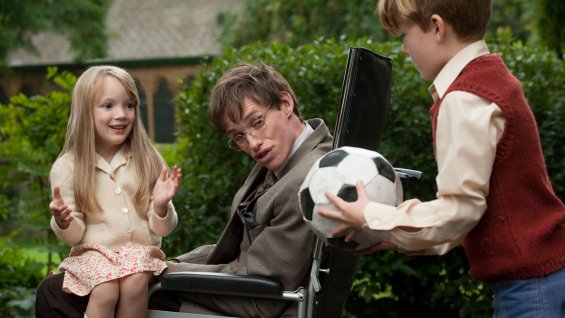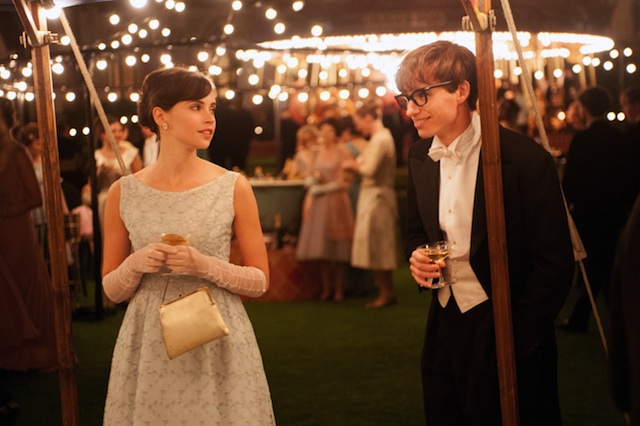If this year’s Oscar-bait films are any indication, the thing to do next year will be to play a black hole. For now, the big movies are content with talking about black holes a lot—McConaughey and company in the epic Interstellar—or more conventionally down-to-Earth; Eddie Redmayne and Felicity Jones in the Stephen Hawking/Jane Hawking biopic The Theory of Everything.
If you’re a science fiction fan or science enthusiast, you might assume (like I did) that The Theory of Everything is a saccharine, manipulative tear-jerker of the Lifetime original movie ilk, and you’re probably not wrong. Which is exactly why you should see it.
Drawing primarily from Jane Hawking’s memoir, Traveling Infinity: My Life With Stephen, there is absolutely no way this film should be viewed as the definitive story of the life and work of Stephen Hawking. Instead, as many reviewers have pointed out, Hawking’s work isn’t the primary subject of the film, but rather, how that work and his unique circumstances impacted his first marriage. The story of Stephen and Jane’s relationship is charted parallel to Stephen’s struggle with ALS, which, as Christy Lemire of RogerEbert.com says, is a relatively “safe and conventional” approach toward telling such a fantastic story.
And yet, when you take a look at just how much of The Theory of Everything is factually accurate in terms of what really happened in Stephen and Jane’s marriage (as L.V. Anderson did over on Slate) the film suddenly becomes a jarring hybrid; neither a feel-good Hallmark movie, nor a struggling genius movie in the vein of A Beautiful Mind or Good Will Hunting. Instead, the cold, naked reality that Jane and Stephen drifted apart over time is depicted more gently here than perhaps in real life, but I’d argue that’s largely due to the standard compression of an entire relationship into two hours. Hawking himself has called the film “broadly true,” both acknowledging that there are some inaccuracies, but not enough to take the truth out of this two-dimensional simulacrum of he and Jane’s multi-dimensional life.
Director James Marsh—famous for Man on a Wire—doesn’t create an arrestingly interesting film, nor do his Hollywood sensibilities ruin or cheapen the life and work of Hawking. In terms of looks, the movie is simply pretty. In an early scene, Hawking and Jane meet at a party and black lights illuminate the whites of the men’s shirts. Hawking likens the Tide stains in their shirts to the birth and death of stars and the cinematography pleasantly evokes period shows suh as Downton Abbey. The acting approach isn’t much different from those shows, either. Say what you will about a melodrama like Downton Abbey, but not a single actor in a production like that isn’t selling their part 110%. The Theory of Everything is exactly the same way, the difference is it’s not nearly as over-the-top as it could be. When I saw the preview for the film months ago, I cringed at the editing and seemingly saccharine angle of the story, but the complete film is more reserved than it might seem. If this is Oscar-bait—and it certainly is—it has a little more class than simply being an exploitive way of making people feel sad about geniuses who struggle.
Hawking’s scientific accomplishments are simplified for the purposes of making a quicker, easier to manage movie. In a pseudo-take-down piece in The New York Times, Elwood H. Smith bemoans various aspects of how Hawking’s work seems belittled by the narrative structure of the film. “Instead of showing how he undermined traditional notions of space and time, it panders to religious sensibilities…” While this statement might be “broadly true,” it’s not entirely true, either. In contrast with a film like Good Will Hunting or A Beautiful Mind, where the audience has NO IDEA what the lone scientist is doing, The Theory of Everything at least conveys, albeit simply, Hawking’s dynamic approach to quantum physics as it relates to relativity, and his initial discovery of Hawking radiation. Smith and others are also upset about the anachronistic use of the term “black hole,” prior to the term being used in real life, but since Hawking was and is interested in time travel, do we really think minor word-time-travel-like anachronisms are really so inappropriate?

The obvious naked singularity in the room here is Eddie Redmayne’s performance as Stephen Hawking. If you have some kind of heart, and you aren’t tired or cranky, you’ll be destroyed by what this actor is capable of here. If the next Star Trek movie decides to put a time-traveling Stephen Hawking into the actual plot, we’re lucky we’ve got Redmayne ready to go. (I don’t know why that is something I want, but it is.) And while it’s hard to steal the movie from Redmayne, Felicity Jones totally tries, and nearly succeeds. Her performance as Jane isn’t “stunning,” or “moving,” it’s just realistic; in other words, damn fine acting. She didn’t pretend to be going through this stuff, I believed that she really was.
The supporting cast is nicely rounded out, too (look, it’s David “Professor Lupin” Thewlis!) and there’s very little to distract you from being immersed in this bittersweet, and ultimately, epically moving story. Culminating in Hawking’s publication of A Brief History of Time, a scene towards the end of the film sees people rising to their feet in wild applause. In this moment, Redmayne’s Hawking fantasizes about being able to get to his feet, too, but of course, he can’t. You’ll wish he could in this moment, and it will break your heart. Which is exactly the point.
The Theory of Everything is saccharine, I suppose, but as Leslie Jamison says in her essay “In Defense of Saccharin(e)” from The Empathy Exams, “If sentimentality is the word people use to insult emotion—in its simplified, degraded, and indulgent forms—then “saccharine” is the word they use to insult sentimentality.” Just because something is sentimental or saccharine, doesn’t mean we should knock it, and if you have problems with The Theory of Everything, that’s okay. But that doesn’t mean its sweetness didn’t work on you, even if only a tiny bit.
Ryan Britt is a longtime contributor to Tor.com and the author of the forthcoming essay collection Luke Skywalker Can’t Read: A New Geek Manifesto (Plume 2015). He lives in New York City.










